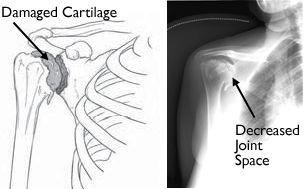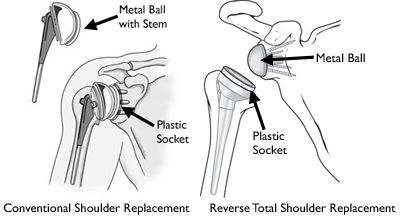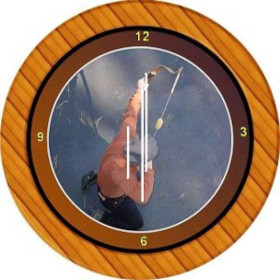I went to a shoulder specialist to have my shoulders checked. The pain is getting pretty tough and shooting is getting even tougher. I've had them checked before so the result was not that surprising but the condition has advanced. I have good range of motion as I stretch and exercise but all motion is painful.
Question...... Have any of you had shoulder replacement surgery and returned to shooting???? I'll add that I am 61 years old not a teenager but in pretty good shape.
I'm not talking about cleaning, scraping, rotator repairs but COMPLETE shoulder replacement. It looks like that is what I'm in for when I can't take the pain anymore........
Basically both of my shoulders......
Osteoarthritis
Also known as "wear-and-tear" arthritis, osteoarthritis is a condition that destroys the smooth outer covering (articular cartilage) of bone. As the cartilage wears away, it becomes frayed and rough, and the protective space between the bones decreases. During movement, the bones of the joint rub against each other, causing pain.
Osteoarthritis usually affects people over 50 years of age and is more common in the acromioclavicular joint than in the glenohumeral shoulder joint.


X-Rays
X-rays are imaging tests that create detailed pictures of dense structures, like bone. They can help distinguish among various forms of arthritis.
X-rays of an arthritic shoulder will show a narrowing of the joint space, changes in the bone, and the formation of bone spurs (osteophytes).
This x-ray shows severe osteoarthritis of the glenohumeral joint.
Reproduced with permission from Crosby LA (ed): Total Shoulder Arthoplasty. Rosemont, IL, American Academy of Orthopaedic Surgeons, 2000, p 18. To confirm the diagnosis, your doctor may inject a local anesthetic into the joint. If it temporarily relieves the pain, the diagnosis of arthritis is supported.
Top of page
TreatmentNonsurgical Treatment
As with other arthritic conditions, initial treatment of arthritis of the shoulder is nonsurgical. Your doctor may recommend the following treatment options:
•Rest or change in activities to avoid provoking pain. You may need to change the way you move your arm to do things.
•Physical therapy exercises may improve the range of motion in your shoulder.
•Nonsteroidal anti-inflammatory medications (NSAIDs), such as aspirin or ibuprofen, may reduce inflammation and pain. These medications can irritate the stomach lining and cause internal bleeding. They should be taken with food. Consult with your doctor before taking over-the-counter NSAIDs if you have a history of ulcers or are taking blood thinning medication.
•Corticosteroid injections in the shoulder can dramatically reduce the inflammation and pain. However, the effect is often temporary.
•Moist heat
•Ice your shoulder for 20 to 30 minutes two or three times a day to reduce inflammation and ease pain.
•If you have rheumatoid arthritis, your doctor may prescribe a disease-modifying drug, such as methotrexate.
•Dietary supplements, such as glucosamine and chondroitin sulfate may help relieve pain. (Note: There is little scientific evidence to support the use of glucosamine and chondroitin sulfate to treat arthritis. In addition, the U.S. Food and Drug Administration does not test dietary supplements. These compounds may cause negative interactions with other medications. Always consult your doctor before taking dietary supplements.)
Surgical Treatment
Your doctor may consider surgery if your pain causes disability and is not relieved with nonsurgical options.
Arthroscopy. Cases of mild glenohumeral arthritis may be treated with arthroscopy, During arthroscopy, the surgeon inserts a small camera, called an arthroscope, into the shoulder joint. The camera displays pictures on a television screen, and the surgeon uses these images to guide miniature surgical instruments.
Because the arthroscope and surgical instruments are thin, the surgeon can use very small incisions (cuts), rather than the larger incision needed for standard, open surgery.
During the procedure, your surgeon can debride (clean out) the inside of the joint. Although the procedure provides pain relief, it will not eliminate the arthritis from the joint. If the arthritis progresses, further surgery may be needed in the future.
Shoulder joint replacement (arthroplasty). Advanced arthritis of the glenohumeral joint can be treated with shoulder replacement surgery, in which the damaged parts of the shoulder are removed and replaced with artificial components, called a prosthesis.
(Left) A conventional total shoulder replacement (arthroplasty) mimics the normal anatomy of the shoulder. (Right) In a reverse total shoulder replacement, the plastic cup inserts on the humerus, and the metal ball screws into the shoulder socket. Replacement surgery options include:
•Hemiarthroplasty. Just the head of the humerus is replaced by an artificial component.
•Total shoulder arthroplasty. Both the head of the humerus and the glenoid are replaced. A plastic "cup" is fitted into the glenoid, and a metal "ball" is attached to the top of the humerus.
•Reverse total shoulder arthroplasty. In a reverse total shoulder replacement, the socket and metal ball are opposite a conventional total shoulder arthroplasty. The metal ball is fixed to the glenoid and the plastic cup is fixed to the upper end of the humerus. A reverse total shoulder replacement works better for people with cuff tear arthropathy because it relies on different muscles — not the rotator cuff — to move the arm.
Resection arthroplasty. The most common surgical procedure used to treat arthritis of the acromioclavicular joint is a resection arthroplasty. Your surgeon may choose to do this arthroscopically.
In this procedure, a small amount of bone from the end of the collarbone is removed, leaving a space that gradually fills in with scar tissue.
Recovery. Surgical treatment of arthritis of the shoulder is generally very effective in reducing pain and restoring motion. Recovery time and rehabilitation plans depend upon the type of surgery performed.
Complications. As with all surgeries, there are some risks and possible complications. Potential problems after shoulder surgery include infection, excessive bleeding, blood clots, and damage to blood vessels or nerves.
Your surgeon will discuss the possible complications with you before your operation.














